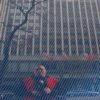In the 2017-2018 ASCA Cities seminar series we examine the city through the idea of entanglement. We will take up ‘entanglement’ in a broad sense to include ideas of spatial, temporal and ethical entanglement in forms of co-production, co-incidence and complicity, but we are also interested in forms of methodological entanglement. Taking our point of departure from recent discussions of ‘entanglement’ in relation to intra-agential realism (Barad 2007), we take this notion as signifying a concern with the ways in which terms of investigation are co-productive. What happens, we wonder, when instead of taking the city as a pre-existing, object of analysis, or object of ‘theory,’ we consider how it is co-produced in encounters with, for example, discourses around, race, gender, ability and ecology?
As such, the seminar will take entanglement as a productive concept that can help us investigate how the urban is co-produced through encounters with a diverse range of perspectives and discourses. One important theme will be the ways in which the notion of entanglement undoes the familiar antithetical constructions of the city and nature – a topic currently being explored in the growing body of research into political ecology carried out by scholars such as Maria Kaika and Erik Swyngedouw. We are also interested in the ways in which the concept of entanglement opens up connections between the urban and the situated knowledge perspectives of feminist science studies, in relation to, for example, epistemologies of waste (Hird 2016, 2017) and geological politics (Colebrook 2017, Grosz 2017).
More generally we will also pay attention to how ideas of entanglement map onto more traditional constructions of urban politics. How useful is the entanglement concept in exploring the relationships between materiality and affect within the context of post-Fordist production, for example? How does it encourage us to rethink traditional ideas of networked cities, and of the relations of cities in a variety of urban contexts around the world? Does entanglement offer an alternative to the methodological dangers of ‘cityism’ or is it simply another form of totalizing theory that leaves existing paradigms and privileges, complicated but untouched.
Sept. 29, 2017: Focused Reading and Discussion. Led by Carolyn Birdsall, Simone Kalkman and Niall Martin, Location: room 101A, Universiteitstheater (Nieuwe Doelenstraat 16-18), Time: 3-5pm
Oct. 27, 2017: Dr. Jess Bier (Erasmus University Rotterdam): “Segregation and Entanglement in the Mapping of Israeli Settlements”, Location: room F 2.08B, Bushuis (Kloveniersburgwal 48), Time: 3-5pm
Nov. 24, 2017: Dr. Scott Rodgers (Birkbeck, University of London): “Ambient Participation: Entanglements of Social Media Platforms, Urban Living and Transformation”, Location: room 101A, Universiteitstheater (Nieuwe Doelenstraat 16-18), Time: 3-5pm
Feb. 23, 2018: Prof. Dr. Maria Kaika (University of Amsterdam): “Don’t Call Me Resilient Again: Immunological Practices vs. Alternative Socio-ecological Imaginaries”, Location: Belle van Zuylenzaal, University Library (UB), Singel 425, Time: 3-5pm
Mar. 23, 2018: Prof. Dr. Carola Hein (TU Delft): “Oil Spaces: The Global Petroleumscape in the Rotterdam/The Hague area”, Location: Belle van Zuylenzaal, University Library (UB), Singel 425, Time: 3-5pm
Apr. 20, 2018: Dr. Jeff Diamanti (University of Amsterdam): “The Future of Dependency: Shell’s Foresight and the Petrocultural Penumbra”, Location: room F 2.08B, Bushuis (Kloveniersburgwal 48), Time: 3-5pm
May 24, 2018: Prof. Dr Ashley Dawson (Princeton Environmental Institute)
– Masterclass “Can New York Be Saved? The Urban Condition during the Anthroposcene”, Location: Potgieterzaal, University Library (UB), Singel 425, Time: 10.00-12.00
– Public talk/discussion “The Energy Commons”, Location: SPUI25, Spui 25, Time: 17.00-19.00

